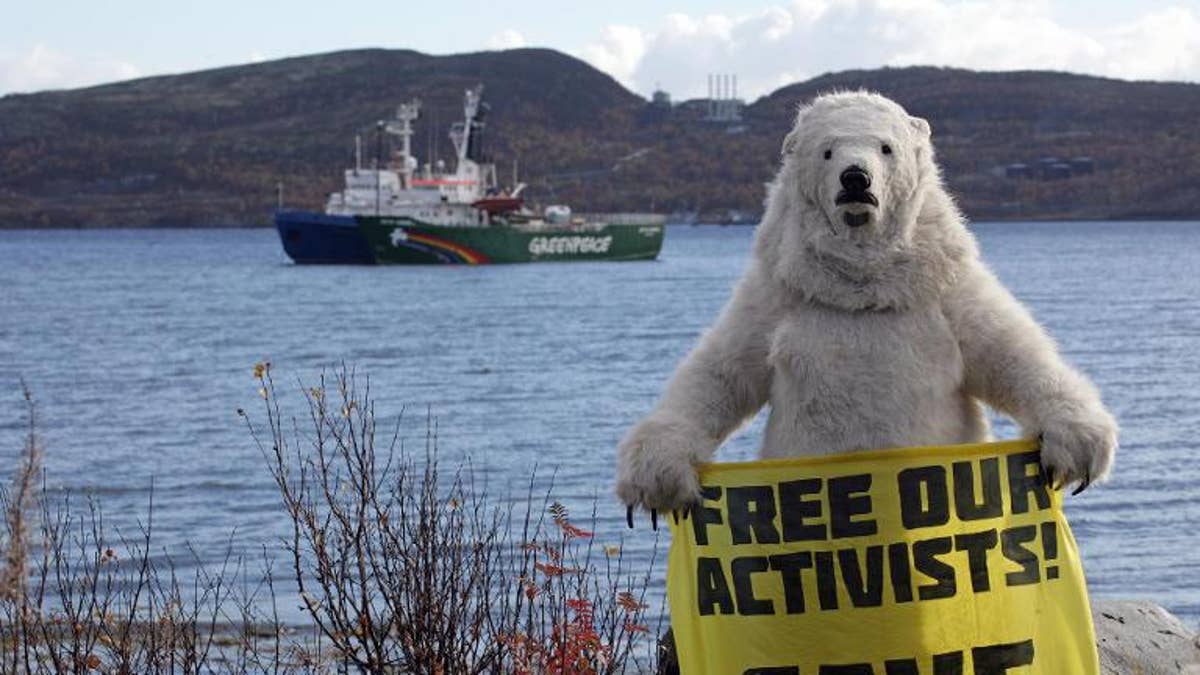
An activist dressed as a polar bear holds a banner in front of Greenpeace's Arctic protest ship, moored beside a Russian Coast Guard ship in Kola Bay near Murmansk on September 24, 2013, in a photo provided by Greenpeace International (Greenpeace International/AFP)
Moscow (AFP) – A Russian court on Thursday ordered two Greenpeace activists to be detained for two months over a protest on an Arctic oil platform, as the Netherlands called for the activists' immediate release and threatened legal action against Moscow.
The first group from the 26 foreign and four Russian activists accused by Russian investigators of piracy over their September 18 protest on a Gazprom oil rig were led into the courtroom in handcuffs after being transported in prison vans.
The Lenin district court in the northern city of Murmansk ruled that Denis Sinyakov, a Russian photographer who works for Greenpeace and Greenpeace expert Roman Dolgov, also a Russian citizen, should be detained until November 24, the Interfax news agency reported.
Sinyakov, a former AFP and Reuters staff photographer, was the first of 30 detained crew members from Greenpeace's Arctic Sunrise protest ship to receive a court decision.
The court was holding several simultaneous hearings into the activists' cases in different rooms of the building. None of the activists has so far been charged.
The Netherlands on Wednesday asked Russia for the immediate release of the activists and said it is considering legal action, the Dutch Foreign Minister Frans Timmermans wrote in a letter to the Dutch parliament.
Russian border guards took control of the Greenpeace ship and locked up the activists after they last week attempted to scale state energy giant Gazprom's Prirazlomnaya oil platform in protest at oil exploration in the Barents Sea.
The border guards, who had seized the vessel after descending on it on ropes from helicopters, then towed the ship to Murmansk, where the activists were held for questioning.
They have been held in detention in Murmansk since late Tuesday.
Greenpeace said that activists were brought into the court building in handcuffs. The handcuffs were taken off before they entered the courtroom cage used for defendants.
An Russian investigator told the court that Greenpeace was suspected of committing "piracy with the aim of seizing property by threatening violence as part of an organised group," Greenpeace Russia wrote on Twitter.
Sinyakov said in court that "all the accusations are baseless" and that "My weapon was my camera," cited by Greenpeace Russia on Twitter.
Greenpeace said that the court justified the decision because Sinyakov does not live in Murmansk and travels abroad frequently.
Dolgov was also ruled held for two months, Greenpeace Russia wrote on Twitter, which was confirmed by RIA Novosti news agency.
He argued in court that he had never left the deck of the Arctic Sunrise because he was briefing journalists as an expert.
His lawyer asked for him to be released on bail.
"Our organisation is not a violent one, it is peaceful," Dolgov said in a hearing broadcast online by RT television channel.
Russian investigators said earlier they would ask the court to rule that all the activists be kept behind bars as the piracy case is investigated further.
The Russian authorities by Thursday evening must either charge the activists, release them or apply for their detention to be extended without them being charged, Greenpeace spokesman Aaron Gray-Block said in an e-mailed statement.
He said the activists had all been interviewed with a lawyer and some with a diplomat from their country also present.
The Investigative Committee said that all the activists, who come from 18 different countries including Britain and the United States, had cited their right to remain silent under the Russian Constitution.
Russia has opened a case into piracy, although President Vladimir Putin took a milder stance on Wednesday, telling an international Arctic forum that "of course they are not pirates."
This has raised hopes that even if they are eventually charged, it will be under a less grave article than piracy.
But Putin said the activists had broken international law by approaching dangerously close to the oil platform.
Greenpeace denies that the activists committed piracy, saying that this only applies to ships and that they held a peaceful protest.
